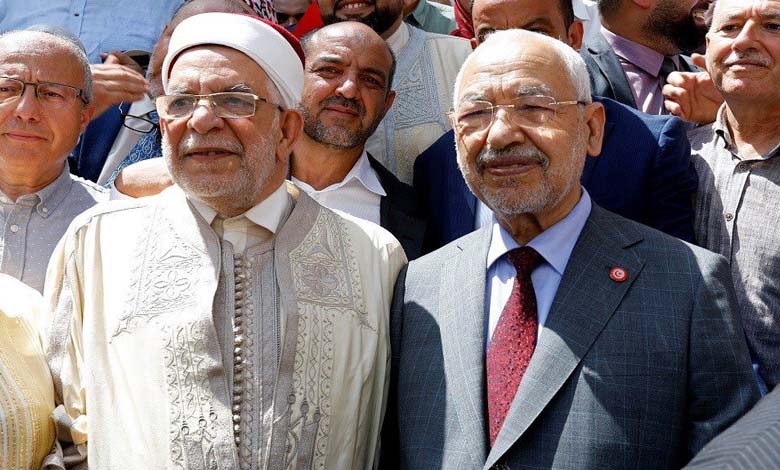Tunisia’s Muslim Brotherhood: Failure in Power and in Opposition

A left-wing coalition opposing Tunisian President Kaïs Saïed has canceled a protest that was scheduled for Friday, aiming to avoid any association with the Muslim Brotherhood movement.
In Tunisia, the Brotherhood held power for nearly a decade. However, widespread public dissatisfaction led to their removal from office. Since then, the group has struggled to maintain influence, even within the opposition landscape.
-
As the election date approaches… Muslim Brotherhood in Tunisia intensifies efforts to disrupt
-
Who is Noureddine Bhiri, the mastermind of the Muslim Brotherhood in Tunisia, accused in the travel case after being sentenced?
What happened?
The Tunisian Network for Rights and Freedoms, a leftist and democratic alliance, had planned to hold a protest on July 25, coinciding with Republic Day — a date also marking the fall of the Brotherhood-led parliament in 2021.
At the same time, the “National Salvation Front,” affiliated with Islamist elements, had announced its own protest for the same day, initially scheduled for midday. However, it later rescheduled the demonstration to 6 p.m., seemingly attempting to align with the left-wing movement’s activities.
-
Saied is determined to eliminate the Muslim Brotherhood in Tunisia… Details
-
Its effects are no less than bombing Palestinian hospitals… Saied speaks about the corruption of the Brotherhood in Tunisia
In response, the secular coalition chose to cancel its mobilization, fearing that a shared presence in the streets could be misinterpreted as coordination with a group classified as terrorist in several Arab countries.
In a statement issued Tuesday, the Network said: “We have decided to postpone the planned protest on July 25 at 6 p.m. to a later date, which will be announced after further coordination with progressive and democratic forces.”
-
The Ennahdha Movement collapses… Crises hit the Muslim Brotherhood in Tunisia
-
Painful end for the Brotherhood in Tunisia… demands to dissolve Ennahdha movement after the arrest of Ghannouchi
What will not happen
The Network clarified that the decision followed in-depth discussions with other civil society actors and democratic political forces, and after evaluating the other protest calls set for the same date and time.
The “National Salvation Front” responded with its own statement, expressing disappointment at the failure of coordination efforts: “Despite the concessions made by the Front to ensure a unified protest, the lack of consensus has led us to postpone our march. We will announce future activities in due course.”
-
The leaders of the Brotherhood in Tunisia before the judiciary.. The start of the investigations of “Deportation of Terrorist”
-
After the failure of the Brotherhood in Tunisia.. Is Kais Saied ending the legacy of Ennahdha and its corruption?
Reasons for failure
Political observers see the refusal of anti-Saïed movements to align with Ennahdha (Tunisia’s Muslim Brotherhood branch) as evidence of the group’s ongoing political rejection.
Tunisian political analyst Monji Essrarfi said the Brotherhood attempted to exploit Republic Day to project an image of strength and street influence. “But in reality,” he stated, “they can only mobilize small crowds due to their continued unpopularity.”
-
Ghannouchi before the courts… Terrorism Surrounds the Head of the Brotherhood in Tunisia
-
On the Eve of the Verdict… Documents Reveal Tunisian Brotherhood’s Plot to Assassinate Kais Saied
He said: “The Tunisian Network for Rights and Freedoms made it clear it would not participate in any protest that could be associated with the Brotherhood. This move exposed the Islamist group’s attempt to break out of political isolation.”
Essrarfi added that Ennahdha remains politically marginalized. Every effort to forge alliances with civil or political forces concerned about democratic decline has failed — largely due to the party’s association with terrorism, political assassinations, and corruption.
July 25 carries deep symbolic weight in Tunisia: it marks the Republic’s founding, the dismissal of the Islamist-led parliament in 2021, and the 2013 assassination of nationalist politician Mohamed Brahmi.
-
Marzouki’s Rebellion Map: A Desperate Bridge for the Return of Tunisia’s Muslim Brotherhood
-
Referral of Several Ennahdha Leaders to the Anti-Terrorism Pole
-
Analysts Reveal Ennahdha Movement’s Plans to Ignite Tensions in Tunisia
-
Tunisian Analyst: Ennahdha uses false propaganda and pressures to undermine elections
-
In Tunisia, Ennahdha and the postponement of the “terrorism trial”: harsher penalty
-
Tunisia’s Brotherhood remnants under scrutiny… Saied: They have no place












